I flew a big-name airline and a budget competitor across the Atlantic. The low-cost option is worth it if you follow the rules.
Taylor Rains

- I recently flew back-to-back in economy on Virgin Atlantic Airways and Norse Atlantic Airways.
- The mainline option, Virgin, has more amenities, but low-cost Norse can offer a better value.
As an aviation reporter, I spend a lot of time reviewing airlines. My job sometimes gives me the perk of long-haul business class, but I mostly sit in economy.
I've traveled in coach on virtually every transatlantic airline, most recently back-to-back flights on Virgin Atlantic Airways and Norse Atlantic Airways between New York and London.
These are two airlines at opposite ends of the spectrum. Virgin is a 40-year-old, big-name mainline carrier, while Norse is a newcomer budget airline trying to make the historically unsuccessful long-haul low-cost strategy work.
While I think Virgin is the better choice regarding convenience and amenities, I'd still recommend Norse to price-sensitive travelers who don't mind giving up a few freebies for a cheaper ticket — so long as they pay attention to the strict bag rules.
Here's how my experiences compared:
I flew on Virgin's Airbus A350 and Norse's Boeing 787.
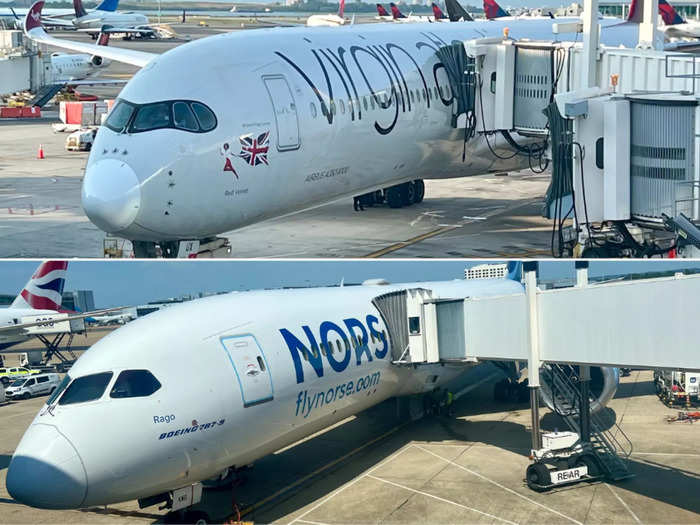
Virgin and Norse approach transatlantic flying very differently. Virgin tickets include complimentary meals and a carry-on. The seats come with headphones and linens.
Budget airline Norse reduces their fares by unbundling the tickets to just a seat and a personal item. Anything extra is a fee — even water.
I paid about $600 for each airline one-way.
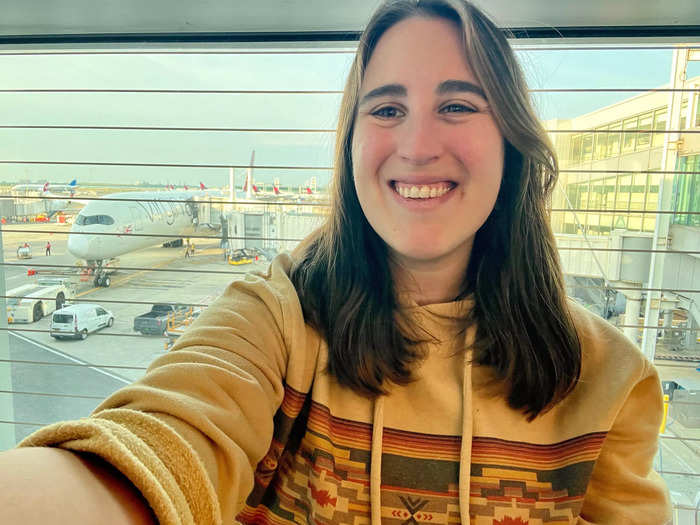
I booked Virgin's lowest-tier economy fare from New York's John F. Kennedy International Airport to London Heathrow. It included two meals and a carry-on bag, and I added a checked bag for $75 and an assigned seat for $50.
I booked my return from London Gatwick on Norse as a bundled fare with a personal item, a carry-on, a checked bag, and one meal. I paid another $30 for a seat. I secured an aisle on both Virgin and Norse and am almost always willing to pay extra for it.
My one-way Norse price was close to Virgin's because it originated from the UK vs. New York. Tickets departing London are typically more expensive than those departing other European cities because of the UK's high taxes and fees.
Google Flights shows that the one-way base fare on Norse (no add-ons) from New York to London this fall is regularly half the price of the cheapest mainline tickets.
However, Norse's bundled fare can sometimes be more expensive than a mainline — so always compare with add-ons included.
Norse's cost-savings make it a good value option, but it can be a headache.
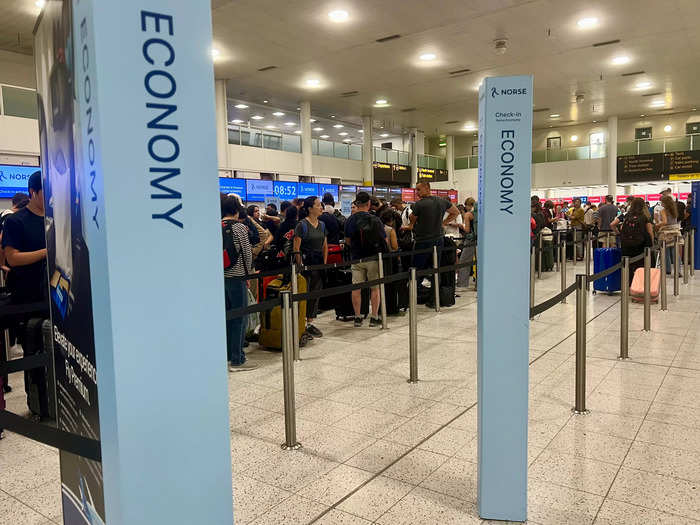
If you are a low-maintenance traveler like me who just needs a headrest and entertainment to enjoy a flight, then Virgin and Norse are easily comfortable.
Budget options come with strict rules passengers must follow to avoid expensive last-minute fees.
Norse also lacks Virgin's network and check-in efficiency, and travelers must remember to bring their own food, drinks, and headphones. Otherwise, pay up or go bored, parched, and hungry.
Norse doesn't have online check-in from London Gatwick.
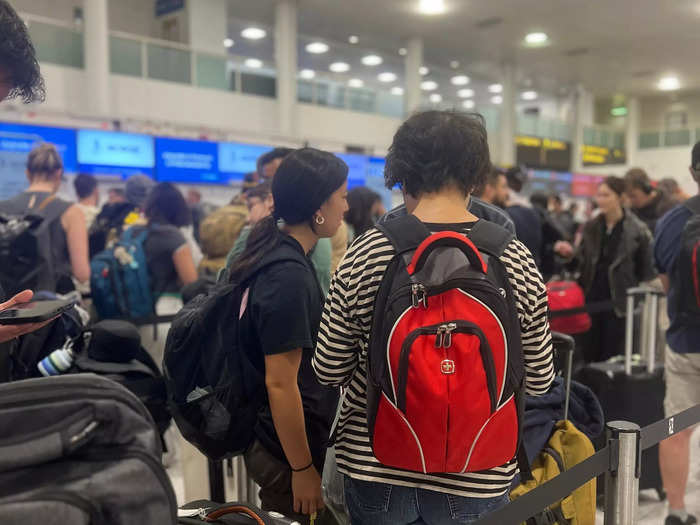
This was one of the rare times I needed to check a bag, so I planned to go to the Norse counter anyway when I got to the airport. However, even those with just a carry-on bag are still required to have their documents manually checked by an agent.
That means Norse passengers can't just show up at the airport with a mobile boarding pass and go straight to security — so budget extra time for check-in.
Virgin's self-serve check-in and bag drop was much simpler.
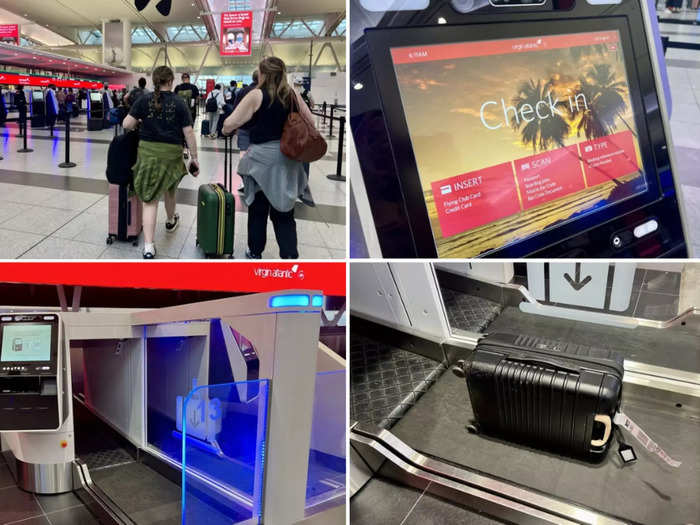
Unlike Norse's Gatwick operation, Virgin's New York-JFK check-in has kiosks where passengers can print their luggage tags without seeing an agent.
The self-serve bag drop was easy. I simply scanned the bag tag, put the luggage on the conveyor belt, and off it went. Employees are also available to help.
Those without checked luggage can get their boarding pass on the mobile app and head to security.
At the Norse counter, almost everyone was asked to verify their bags met requirements.
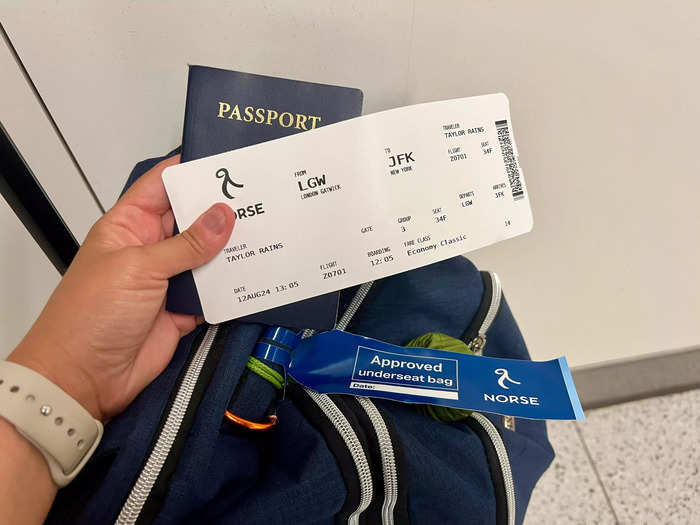
Norse makes money from ancillary fees like bags, snacks, and reserved seats. Bags are lucrative, with the world's largest airlines securing an estimated $33 billion in luggage revenue in 2023.
This means they're strict about the size and weight — and those who arrive at the airport unprepared will feel it in their wallets.
Those who didn't pass were given time to rearrange their bags to make them fit or pay extra.
Last-minute bags on Norse cost up to $300.
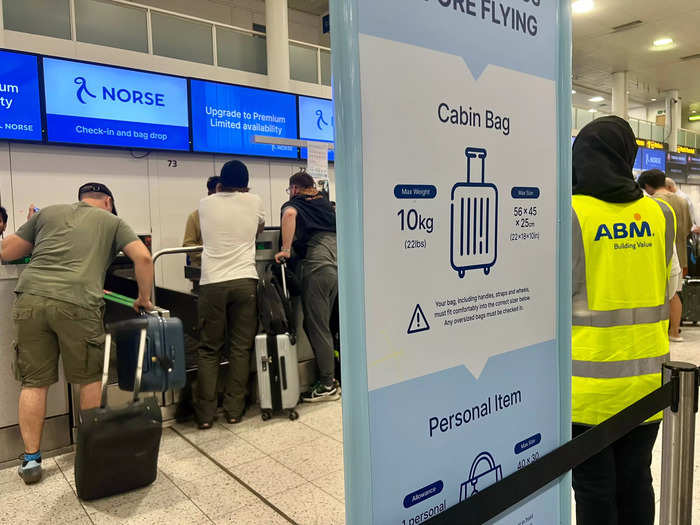
According to Norse's website, a personal item can be a maximum of 15.5 x 11.5 x 5.5 inches with no weight limit, while carry-on bags can be a maximum size and weight of 22 x 18 x 10 inches and 22 pounds.
Premium economy travelers get a bigger personal item, which can be no larger than 17 x 14 x 8 inches. The carry-on size allowance is the same but can be up to 33 pounds.
Each allowed piece of standard checked luggage can be a maximum of 62 linear inches and 50 pounds in all cases. Norse's website outlines the imposed fees of up to $300 — which apply per person and per leg — if people show up to the airport with oversize, overweight, or unpaid bags.
Norse and Virgin offer the same legroom in regular economy.
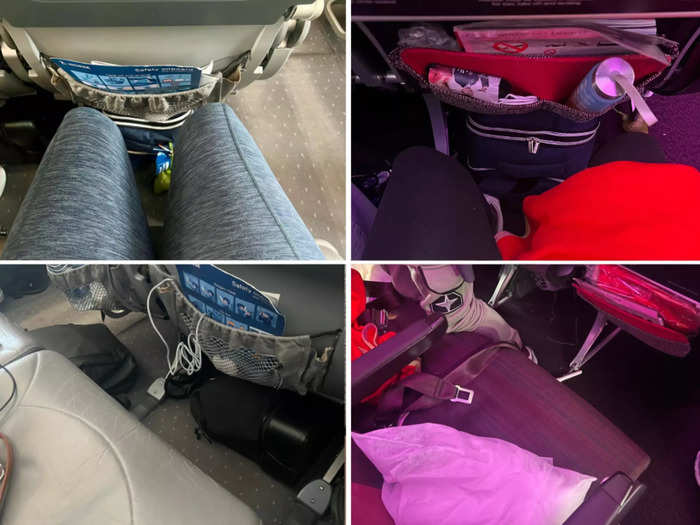
Besides the fare structure, the main difference between Norse and Virgin is the aircraft cabins.
Norse's all-Boeing fleet has only economy and premium economy seats, while Virgin's mixed Boeing and Airbus fleet offers business class and luxuries like lounges and bars.
Virgin's economy section is sleeker, but both it and Norse offer 31 inches of pitch and about 17 inches of width. Each was spacious enough for my five-foot-three-inch tall self.
Norse economy passengers get the bare basics, while Virgin has added touches.
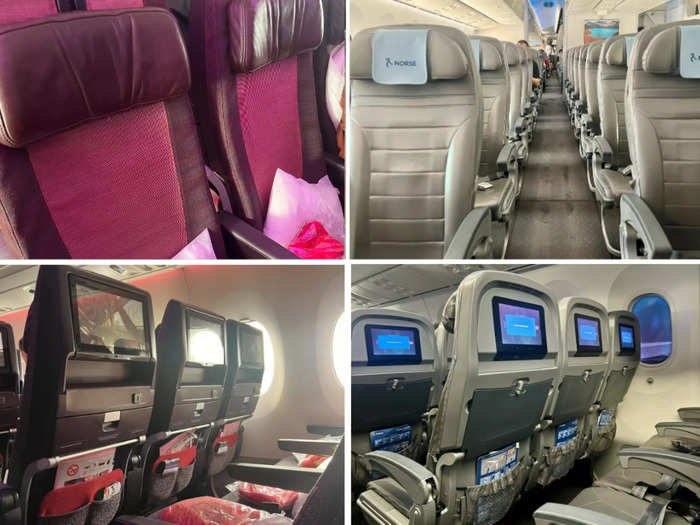
Both airlines have seatback screens loaded with content, power ports, and headrests — the latter a must for me to be comfortable. That's about it for Norse.
The low-cost carrier's seatback pocket was big enough for a water bottle and laptop but lacked Virgin's two smaller pockets (not a big deal, but notable for organizing purposes).
Virgin also includes a pillow, a blanket, and headphones. Norse passengers who forget wired headphones must pay $6.50 for a set. A "comfort kit" stocked with a blanket, a neck pillow, earbuds, and an eye mask costs $9, or passengers can request just a blanket for $6.50.
Virgin had more entertainment content.
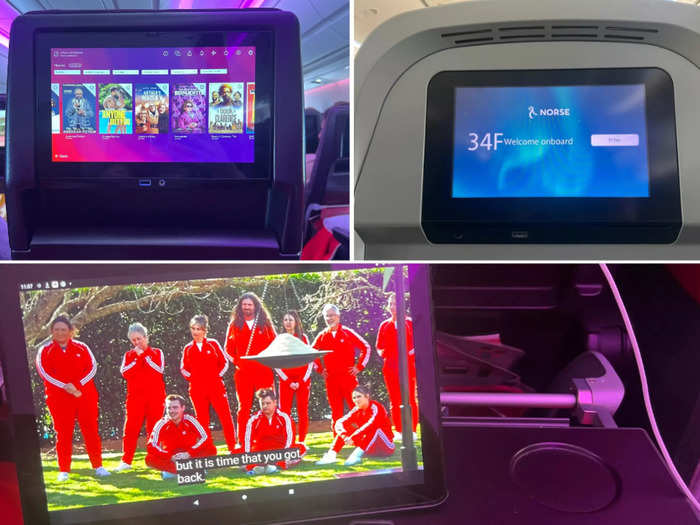
Virgin's seatback screen was crisper than the one on Norse, and I noticed it had more and newer movie options.
Virgin even had a nifty outside camera.
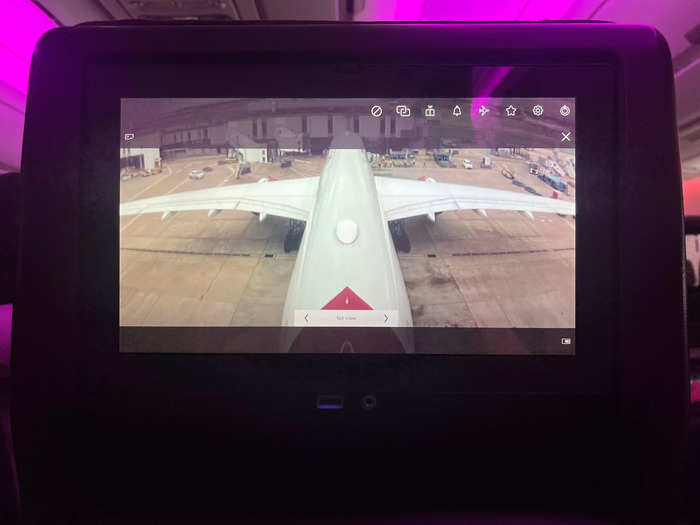
The aviation enthusiast in me loved the plane-following system on the seatback screen, which allowed passengers to see the A350's surroundings in real time via an outside camera.
Norse's system wasn't as unique.
WiFi is available on Virgin — but it's not free.
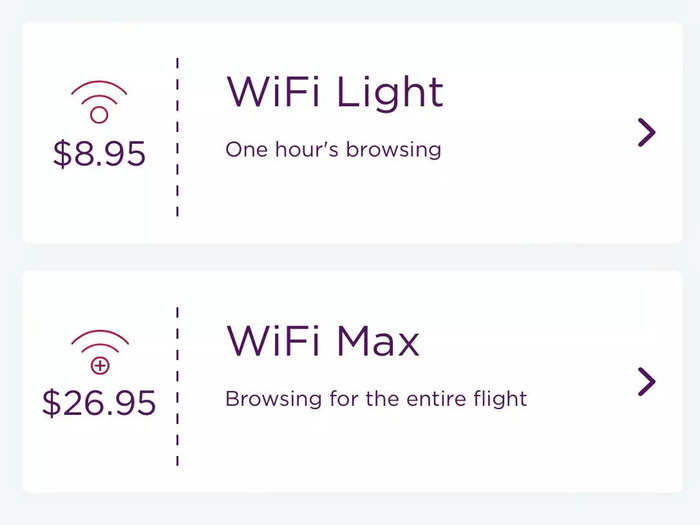
Unlike other transatlantic options Delta Air Lines and JetBlue Airways, Virgin does not offer complimentary internet. Instead, messaging, browsing, and streaming all cost.
Norse, however, doesn't have the option at all.
The meals were good for airplane food, but I got two on Virgin.
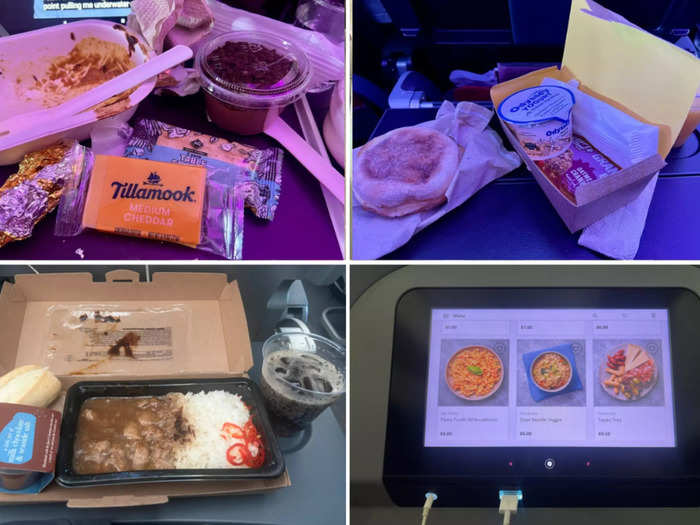
Meals cost extra on Norse, and I only paid for one. Virgin's basic ticket still included two, but I found one meal kept me full enough for the eight-hour trek.
The first meal on Virgin was a breakfast box with a sandwich, a granola bar, and yogurt. Lunch was a chicken dish with cheese, salad, and pudding.
Norse's meal was chicken, bread, chocolate pudding, and a non-alcoholic drink. The low-cost carrier also lets passengers order meals and drinks from the seatback screen.
Neither airline left me waiting too long at baggage claim.
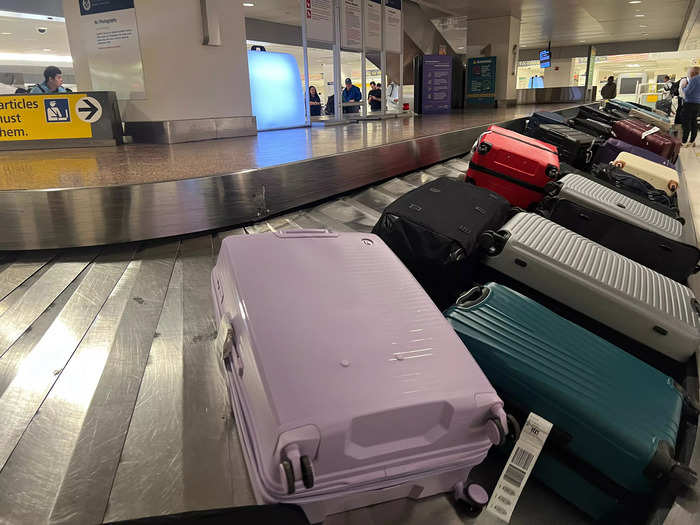
I prefer not to check luggage because I am impatient and don't want to spend time checking my bags before departure and picking them back up after landing.
However, this trip required checked luggage, and I only waited 10-20 minutes after each flight.
I had no issues with the low-cost option because I arrived prepared.
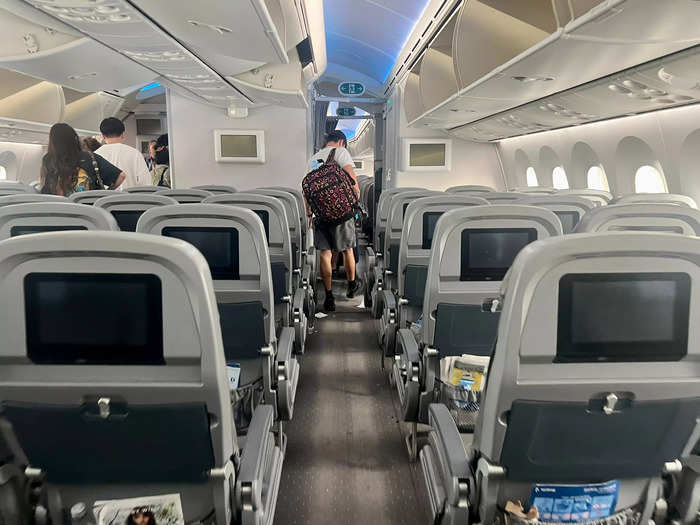
I always carry wired headphones regardless of airline because they are typically uncomfortable or scratchy. I also brought a jacket, my own water, a protein bar snack, and a tablet with pre-downloaded content — though Norse's movie options were perfectly fine.
The blanket on Virgin was appreciated, though, because it was designed with wings to drape over your shoulders so it doesn't fall off when sleeping.
I can imagine travelers who don't want to worry about bag size and bringing their own meals might prefer Virgin's model to Norse. It's simply an easier experience.
Price-sensitive customers can expect comfort on Norse, but Virgin is overall better.
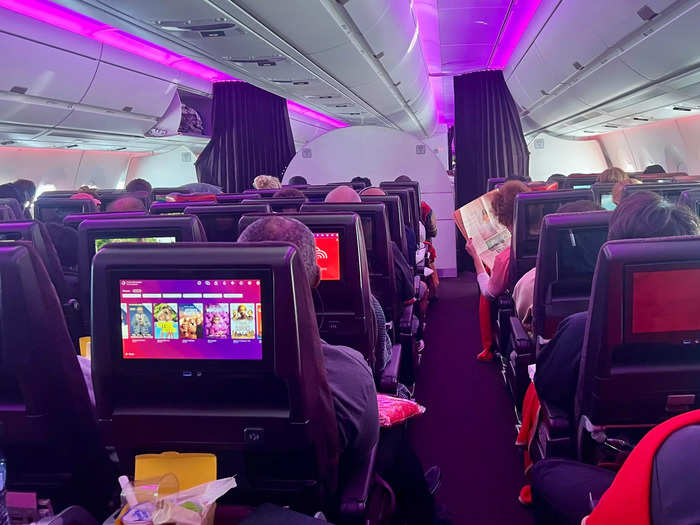
Virgin's A350 is quiet and spacious, and I think it has a much more elegant look than Norse's bland 787 cabin and better amenities, like the blanket and WiFi.
However, the budget option is just as comfortable seat-wise, and there are enough good IFE options to pass the time.
Personally, I don't mind Norse and would choose it again over Virgin if the price is right. Still, Virgin is a great transatlantic pick overall if you're not sold on the low-cost business model.
Norse's flight frequency is a drawback, but I like its route options from New York.
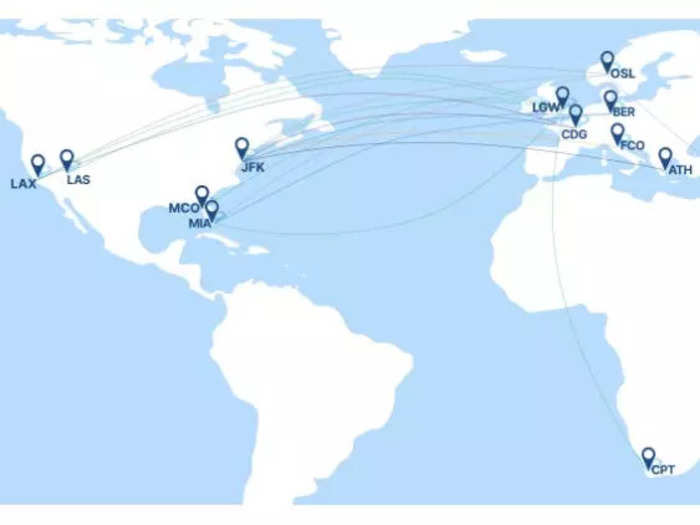
Virgin's well-established network means it flies several times daily to London and can connect to nearly every corner of the globe, giving passengers more choice. For example, I opted for Virgin on the outbound because I could take a daytime flight, which helps me better battle jet lag.
Norse, by comparison, only has red-eyes to London — but it also offers nonstops to several other European cities from New York, and with no layover. This includes Athens, Berlin, Oslo, Paris, and Rome.
Its point-to-point network also flies nonstop to Europe from Las Vegas, Los Angeles, Orlando, and Miami. And, although less robust than most mainlines, Norse can connect to even more cities on both sides of the pond via its partnerships with low-cost carriers like easyJet and Spirit Airlines.
Popular Right Now
Popular Keywords
Advertisement